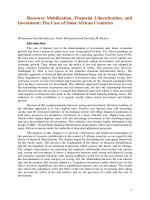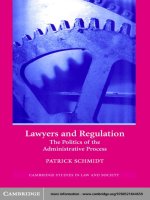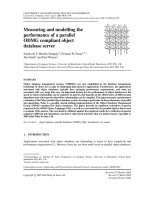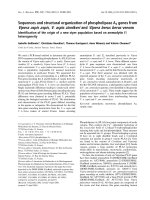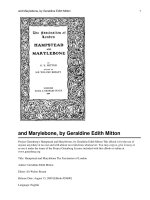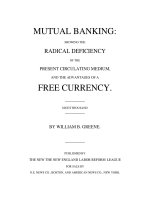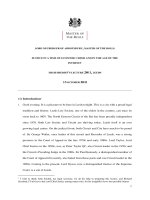Gold, Peace, and Prosperity..Gold, Peace, and Prosperity:The Birth of a New Currency Second pptx
Bạn đang xem bản rút gọn của tài liệu. Xem và tải ngay bản đầy đủ của tài liệu tại đây (3.68 MB, 111 trang )
Gold, Peace, and Prosperity
Gold, Peace, and Prosperity:
The Birth of a New Currency
Second Edition
Ron Paul
LvMI
MISES INSTITUTE
First printing 1981 by the Foundation for Rational Economics
and Education
Pocket paperback edition Copyright © 2011 Ludwig von Mises
Institute and published under the Creative Commons Attribution
License 3.0. />Ludwig von Mises Institute
815 West Magnolia Avenue
Auburn, Alabama 36832
mises.org
ISBN: 978-1-61016-196-1
Dedication
To Carol, whose love and support
are more precious than gold.
vii
Contents
Foreword by Henry Hazlitt ix
Preface by Murray Rothbard xiii
Impending Social Strife? 1
The People are Demanding an End to Inflation 3
Depreciation is Nothing New 5
“Not Worth a Continental” 7
The Best Medium of Exchange 11
Cross of Paper 15
How Our Money was Ruined 19
1. The Gold Coin Standard 20
2. The Gold Bullion Standard 22
3. The Gold Exchange Standard 27
4. The Managed Fiat Currency Standard 32
The Stage is Set 35
Is Business to Blame? 39
Are Banks to Blame? 41
Are Unions to Blame? 43
Gold, Peace, and Prosperity
viii
Inflation and the Business Cycle 45
The Guilt of the Economists 49
The Alternative to Inflation 53
Money and the Constitution 55
Morality and Transfer Payments 59
Citizen Control of Money 61
Day of Reckoning 63
Free Market Money? 67
Legal Tender Laws 71
An Historical Precedent 73
The End—or the Beginning 77
Index 85
ix
Foreword
I
n this short pamph let, Congressman Ron Paul
has written one of the most enlightening explana-
tions of inflation that I have ever read. It is both a
history and an analysis. That history goes back fur-
ther than our Revolutionary War, but as a continuous
narrative it begins, as it should, in 1913 and 1914.
In the first of those years the United States passed
the Federal Reserve Act, which in addition to provid-
ing only a fractional gold cover for Federal Reserve
notes and deposits, made it possible for the commercial
banks to borrow from the newly created Federal
Reserve Banks. They could thus increase their own
loans, and therefore the “money supply” they could
bring into being. This made inflation possible; but
this fact was not generally recognized as long as gold
convertibility of the outstanding paper currency was
maintained.
Gold, Peace, and Prosperity
x
What happened in 1914 was more obvious and
more dramatic. World War I broke out, and the bel-
ligerents instantly suspended gold conversion of
their currencies. Each nation did that for “self protec-
tion.” Each belligerent knew that other countries
would be unlikely to accept its paper currency at
par, or would in any case immediately turn it in for
gold. So each belligerent kept its gold supply as a
final reserve, to be paid out only when other countries
would accept no other means of payment.
After World War I, the belligerents eventually
returned to a gold standard, but meanwhile they
had enormously expanded their paper currency and
raised their “price levels,” and so were to suffer the
drastic commodity price collapse of 1920 to 1921, and
the crisis of 1929 to 1933.
But I do not wish to trench here on Dr. Paul’s
excellent account. When he comes to analysis, he
shows that inflation is always the result of an increase
in the money supply, either encouraged or initiated
by government action. He not only points out that
this money supply increase must be halted if we are
to escape even greater economic devastation, but he
makes clear why we are altogether unlikely to halt
the increase until we return once more to a real gold
standard.
Foreword
xi
One of the great merits of Congressman Paul’s
account is that it avoids all technicalities, and enables
the reader to recognize step by step what has hap-
pened to us and how we can return to monetary and
economic sanity.
— Henry Hazlitt
xiii
Preface
R
on Paul is a most unusual politician—in many
ways. In the first place, he really knows what
he’s talking about. He is not only for the gold stan-
dard. He knows why he is for it, and he is familiar
with the most advanced and complex economic
insights on the true nature of inflation, on how infla-
tion works, and how inflationary credit expansion
brings about booms and busts. And yet Ron has the
remarkable ability to take these complex and vital
insights and to present them in clear, lucid, hard-
hitting terms to the non-economist reader. His eco-
nomics is as sound as a bell.
But, even more important, Ron Paul is an unusual
politician because he doesn’t simply pay lip service
to moral principles. He believes in moral principles
in his mind and heart, and he fights for them pas-
sionately and effectively. High on his set of moral
Gold, Peace, and Prosperity
xiv
principles is the vital importance of individual free-
dom, of the individual’s natural right to be free of
assault and aggression, and of his right to keep the
property that he has earned on the free market, and
not have it stolen from him by confiscatory taxes and
government regulations.
Ron Paul, in short, is that rare American, and
still rarer politician, who deeply understands and
battles for the principles of liberty that were fought
for and established by the Founding Fathers of this
country. He understands that sound economics,
moral principles, and individual freedom all go
together, like a seamless web. They cannot be sepa-
rated, and they stand or fall together.
Ron Paul understands that all three parts of this
system of liberty have been under grave attack for
decades, and that the main problem is the federal
government itself. The government has systemati-
cally eroded and invaded property rights, has piled
on ever higher taxes, ever more onerous regulations,
and, most sinister because most hidden, has eroded
the value of the dollar and of all of our savings
through inflation. Ron Paul is an unusual politician
because he is not content to shrug his shoulders, to
“go with the flow,” as Californians say, or to go along
in order to get along. He is a man of honor as well
Preface
xv
as a man of principle, and so he has, ever since he
got into politics, been doing something about it. He
has fought, sometimes single-handedly, for our liber-
ties and for our savings.
Inflation, as Ron Paul points out, is caused by
the government’s continual creation of new money,
by what amounts to its system of legalized counter-
feiting. But, if that is so, why not simply urge the
government to stop the creation of money? Why not
point out to our rulers the bad consequences of their
actions? But Ron Paul realizes that this kind of edu-
cation, or even pressure, is not going to work by
itself. For we are dealing not simply with ignorant
or misled people; we are dealing with a pernicious
system.
Let us put it this way: give any man or group
power, and it will tend to use that power. If the power
is inherently abusive, then that power will be abused.
Our present system gives to the federal government
and its Federal Reserve System the unlimited power
to counterfeit. The problem is that if the Fed has the
power to counterfeit, it will inevitably use that power.
Why? Because the power to counterfeit is too tempt-
ing. The power to create money means that it is far
more tempting to print it than to work for it. It means
that the counterfeiter can pay his debts, spend more
Gold, Peace, and Prosperity
xvi
money, give more money to his friends and associates.
In the case of government, the power to counterfeit
means that government’s debts can be paid without
levying taxes, that government spending can increase,
and that political allies can be purchased and
maintained.
The power to counterfeit is the power to abuse. It
is not enough to urge the government to use it more
moderately. The power must be taken away.
Counterfeiting is fraud, and no one should have the
right to counterfeit, least of all government, whose
record of counterfeiting throughout history is black
indeed. Money and banking must be separated from
the State, just as Church and State are separated in
the American tradition, just as the economy and the
State should be separated.
Vital to this necessary reform is the return to a
money which is a useful product produced by the
free market itself. In every society, people on the
market voluntarily arrive at one or two commodities
which are the most useful to use as a money. For
thousands of years, gold has been selected by count-
less societies as that money. The only alternative to a
market commodity-money is what we unfortunately
have now: paper tickets issued by the government
and called “money.” Since the paper tickets—dollars,
Preface
xvii
francs, pounds sterling, or what have you—are issued
by the government, the government can issue any
amount it arbitrarily chooses. Counterfeiting is built
into the system, and hence so is inflation and eventual
destruction of the currency.
The only genuine solution to the evil of inflation,
then, is to separate money from the State, to make
money once again a market commodity instead of
a fiat ticket issued by the central government. The
dollar must once again be what is was originally
until it was, in effect, nationalized. The dollar must
once again be simply a name for a unit of weight of
gold coin. Only this kind of fundamental reform
will cure the ravages of inflation. Because Ron Paul
is one of the few men in public life who truly under-
stands the problem and is willing to fight to cure it,
it is truly a pleasure for me to write the preface to
this booklet.
— Murray N. Rothbard
1
Impending Social Strife?
T
he gr eatest threat facing middle and working
class Americans is our depreciating paper
currency.
At least when the kings of old debased their
coinage, by adding copper to the precious metal,
there was still some objective value to the resulting
money. But as economist David Ricardo observed
almost two centuries ago, when money costs noth-
ing, it will become worth nothing.
“Government,” said Ludwig von Mises, “is the
only agency that can take a useful commodity like
paper, slap some ink on it, and make it totally
worthless.”
Today, thanks to 67 years of central bank control
over the money supply, we face an economic and
political crisis greater than any we have faced before.
Gold, Peace, and Prosperity
2
We probably will see widespread civil disorder
in the 1980s, as a direct result of our faltering economic
system. The dollar has been damaged by decades of
interventionism, and Congress has legitimized depre-
ciation of the dollar and forced redistribution of wealth
through corporate and social welfare schemes.
All aspects of the interventionist system threaten
freedom and social peace, but money is the major
issue, since it is the lifeblood of all economic transac-
tions. If we are to reverse the trends of the past six
or seven decades, honest money and monetary
debasement must become top concerns of ordinary
Americans.
The late Martin Gilbert, head economist for a
Swiss bank, was a convert to the gold standard. Among
his employees was a young manual worker. “Once a
month,” said Gilbert, “he took part of his pay and
bought a gold coin for his wife. I remonstrated with
him about it once, and he said, ‘Look, don’t you
Americans come over here and try to tell us how to
live. I go home and I give that coin to my wife, and I
tell her, “If something happens to me, and to the bank
and all the governments, you can go into the coun-
tryside and give it to a farmer, and with that coin you
can eat for a week.”’ I came around to the opinion
that he knew something I didn’t know.”
3
The People are
Demanding an
End to Inflation
T
he recent chaos in the money markets is telling
us that the world is rejecting the American dol-
lar as a reserve currency, and agreeing with the
young man in Martin Gilbert’s story. Tragically, there
is probably little future for the dollar, or dollar-
denominated assets.
Because all other nations are inflating and
therefore destroying their currencies, trading foreign
currencies to protect against the ravages of a depre-
ciating currency is also becoming less attractive.
The alternative, as it has been throughout history,
is to seek and hold real money: gold and silver.
Fifty years of systematic monetary destruction
now threaten the existence of our constitutional
Gold, Peace, and Prosperity
4
republic. The American people are frightened by
what they see, and they are demanding that the
inflation stop. More citizens are realizing that
Congress and the Federal Reserve have generated a
flood of paper money with no intrinsic value.
It is rare to find anyone today who believes that
wealth can come out of a printing press. The corpo-
rate bailouts, guaranteed loans, government contracts,
and welfare gimmicks all have failed, and the people
can no longer be duped.
Politicians who have been in office for too many
years, and have therefore lost touch with the people,
pay no heed to the rising clamor for money of real
value. But the old scapegoats no longer work. Blaming
Arabs, businessmen, labor unions, or consumers for
rising prices doesn’t drown out the steady hum of
printing presses running 24 hours a day, ballooning
the money supply, and thereby debasing every dollar
previously printed. Congress alone is responsible
for inflation, and Congress alone can stop it. It has
shirked its responsibility for decades, but events
are making a continuation impossible. It is time
now to prepare for monetary reform.
5
Depreciation is
Nothing New
I
n Marco Polo’s great book of travels, he talks
about a coin called the bezant circulating in Kublai
Khan’s Mongol Chinese empire. The emperor, like
the vast majority of politicians, found the lure of
paper money irresistible. In his case, however, it was
money printed on pieces of mulberry tree bark. The
same disastrous effects, seen everywhere else in
history, followed. Prices increased, and the gold
bezant took on increasing importance for the people
as the government debauched the irredeemable fiat
currency. Abuse of paper money helped lead, notes
Antony Sutton, to the expulsion of the Mongol
dynasty from China. Government demands that the
people accept printed mulberry bark as equivalent
to metallic money had no effect.
Gold, Peace, and Prosperity
6
The bezant, however, was minted not by the
Chinese, but by the Byzantine Empire. For ten centu-
ries Byzantine coins were accepted all over the world,
and Byzantium dominated trade for thousands of
miles in every direction from Constantinople. Even
the royal accounts of medieval England, says Dr.
Sutton, were kept in bezants. The Byzantine Empire
only declined when it debased the bezant, adding
more cheap alloys and removing gold.
A gold bezant, the major trading coin of Byzantium.

